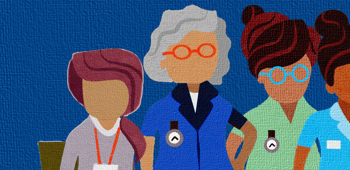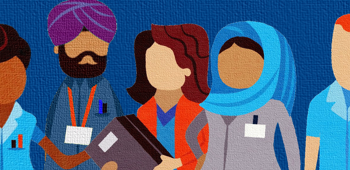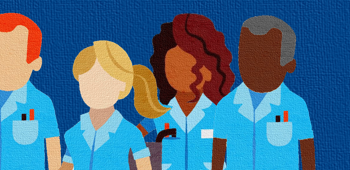How does peer networking work?
What to expect when you join the RCN's peer support network for members who are neurodivergent or have lived experience of disability.
The RCN's peer network is for members who have lived experience of disability or who are neurodivergent. The network offers the chance for you to get in touch with others in a similar situation. On this page we run through how it works, so you know what to expect if you choose to join.
Our networking service uses a database to put you in touch with other members in a similar situation to you.
We do this by pulling out key elements of the personal statement you submit when you join. (see the joining form)
For example, if you say in your statement that you are a student with dyslexia, we will send you details for some of the other group members who are studying and dyslexic. We may also send you some established group members with great strategies to inspire you.
Some further examples:
- A mid-career nurse with Ehlers Danlos Syndrome
- A nursing support worker with mobility issues
- A nurse with 30 years experience who keeps hitting sickness triggers
- A community nurse who needs coping strategies for working in the community with fatigue.
We welcome ill health retired and retired members with lived experience of disability or neurodiversity.
We use the database to pull everyone who could be a match, then we match by eye to try and get you the most meaningful connections.
Tip: When you write your statement, try to really focus on what is important to you. Is it your condition or your symptoms? Or perhaps you are looking to feel less alone or get coping strategies.
Your statement, contact phone numbers, email address and region are all shared. You can provide just your email or just one phone number if you want to limit how others can contact you.
We email you your contacts file. It is password protected using your RCN membership number.
When new members in a similar situation to you join, you may feature in their contacts file.
You can update your statement by contacting us.
We send a satisfaction survey roughly one month after you join to see how you are finding the service.
You can always email us if you are seeking advice or support peer.support@rcn.org.ukAny RCN member with lived experience of disability or neurodiversity (or both) is welcome.
The network needs you to be actively involved in order to work.
You are in control of making contact with anyone in your contacts file that you want to speak to.
We recommend contacting by email in the first instance, as members may be busy when you contact them.
Members go on to converse by email, online chat, phone and text message, by agreement.
You should also respond to members who contact you.
If you are unable to respond or wish to leave the group, you should let us know so that new members aren’t disappointed when they contact you and don’t hear back. See pausing or leaving peer networking.
Please remember:
The network is about reciprocal support. Sometimes you may need support, but try to give back when you can.
The network isn’t for professional support as everyone’s situation is different. Contact RCN Direct for professional employment advice.
Don’t contact members at antisocial hours.
Try to arrange mutually convenient times to chat by methods that suit you both
It is your responsibility to decide what details you share about yourself.
Don’t share member’s contact details with others.
Only contact members for peer support, unless otherwise agreed.
If sending a group email, BCC (blind carbon copy) members so that others can’t see their emails. This is a data protection requirement.
Don’t share the contact sheet, don’t print it or save it anywhere unsafe and delete it if you don’t need it anymore.
Contacts often don’t regularly update their statements, so their situations may have progressed.
Things change!
You can update your statement by filling in the joining form again or by emailing peer.support@rcn.org.uk .
You can also request some fresh contacts by emailing us.
If you need to pause being in the network for any reason, please email us. This will mean that no new joiners are sent your contact details until you let us know you are ready. Members who are already in touch with you may still get in touch – please try to let them know that you are taking a break from the network if you can.
You can also leave the group entirely by emailing us.
If you leave RCN membership you will be removed from the network.
Please delete your contact sheets when you leave the network.

Join Peer Support







